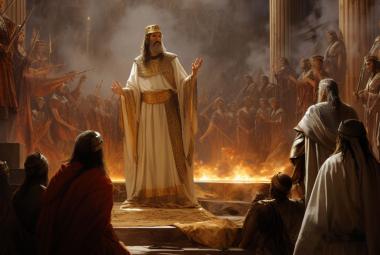Luke, Volume II, commonly known as "The Book of Acts," completes the "Pentateuch of the New Testament." Regarded by many as the most exciting and relevant book for the current believer, it is, indeed, one of the most rewarding and instructive.
Pre-Trial Documents?
Roman law required written documents, containing all the pertinent background regarding a case, to precede an appellant's appearance before Caesar. There are some scholars who suspect that the two volumes penned by Luke were to comply with those requirements.
In a world denied the conveniences we currently take for granted with copiers and fax machines, it is hard for us to appreciate a culture entirely dependent upon handwritten documents (that's why we call them manu-scripts). To compile a comprehensive history of the facts surrounding Paul's appeal to Caesar was an expensive undertaking, and some assume that the official known as Theophilus was Luke's sponsor.
(We now understand that Matthew was among those skilled in shorthand: it was a requirement for his profession as a customs official. That's why his Gospel includes the extensive discourses: he would have been able to take them down verbatim. Without the discourses, Matthew's Gospel would be shorter than Mark's.)
An analysis of Luke's writings seems to support the pre-trial thesis. His consistent emphasis in the various episodes always focuses on establishing the responsibilities of the Jewish leadership in instigating the numerous uprisings, rather than Paul. The avoidance of civil unrest would have been the primary concern of the Roman administration. It is also interesting to note that, in Luke, centurions are always presented as "good guys."
The "Acts of the Apostles"?
The traditional title of this book is, in some respects, a misnomer: it primarily deals with the "acts" of Peter (Chapters 1-12) and Paul (Chapters 13-28). It really should be called "The Acts of the Holy Spirit." Jesus had indicated that the next phase of God's program would be "The Comforter's":
Nevertheless I tell you the truth; It is expedient for you that I go away: for if I go not away, the Comforter will not come unto you; but if I depart, I will send him unto you.
John 16:7
Certainly He, the Holy Spirit, is the principal mover behind the scenes. (It is interesting that the Holy Spirit is always modeled as "an unnamed servant" in Biblical typology.1 Jesus also explained why:
Howbeit when he, the Spirit of truth, is come, he will guide you into all truth: for he shall not speak of himself; but whatsoever he shall hear, that shall he speak: and he will shew you things to come.
John 16:13
Some Amazing Chapters
Among the pivotal passages are several that have significance far beyond the immediate narrative. Perhaps foremost of these is Chapter 2, in which we see the fulfillment of the prophetic significance of the Hag Shavout, "The Feast of Weeks" (or "Pentecost"), in the outpouring of the Holy Spirit, generally regarded as the birth of the Church. (Why is the Book of Ruth always read at this time?2 )
Another chapter with special revelations is Chapter 7, where young Stephen has the chutzpah to give a review of the Old Testament to the most august body of the Jews, the Sanhedrin. Hidden behind the subtleties of the text are clues that reveal a number of surprises, such as Abraham's delay in responding to God's call in Genesis 12,3 and the fact that the Pharaoh that oppressed Israel prior to the exodus was not Egyptian! 4
Another of the pivotal chapters in Acts is the famous "Council of Jerusalem" in Acts 15, at which James adjudicates the debate over what a Gentile must do to be saved. It is also significant in underscoring that God is not finished with Israel. His quoting from Amos 9 provides a prophetic overview of what is still ahead. (James uses the strange phrase, "the Tabernacle of David." It almost seems like an oxymoron, like "the seed of the woman" in Genesis 3:15. The Tabernacle was Levitical; the kingship was of Judah. Is there a prophetic relationship between this peculiar phrase and the visit of Philip with the Ethiopian treasurer in Acts 8? Why is the "Mercy Seat" covering the Ark of the Covenant always described separately in the Torah? We'll explore some provocative conjectures surrounding this and related topics in one of our future issues.)
Remaining Mysteries
There are some other lessons hidden within this fabulous book. For example, what Bible study, repeatedly recorded in the Book of Acts, was given by seven different people on twelve different occasions, and always proved extremely fruitful, yet is rarely given today? The answer: presenting Jesus Christ entirely from the Old Testament. It was the only "Scriptures" they had then; the "New Testament" was still in the process of being compiled. Could you do that? Could you present, to your Jewish friends, Jesus as the Messiah-entirely from the Old Testament? It's not hard if you are prepared.5 In the meantime, we encourage you to dig into this uniquely relevant and rewarding book of God's Word.
Notes:
- In Genesis 24, as He gathers a bride for the son. In Ruth 2, where He introduces Ruth, the Gentile bride-to-be, to her Kinsman-Redeemer, Boaz.
- For a complete review of the many prophetic surprises hidden behind the Mosaic feasts, see our Briefing Package, The Feasts of Israel.
- Abraham, contrary to God's instructions, simply moved "up river," to Haran until his father died; and then moved on to Canaan. But his sins, too, have been "blotted out."
- Acts 7:18-"another" king arose: the Greek has two words of "another": allos, another of the same kind; and heteros, another of a different kind. Stephen uses the latter, highlighting that the Pharaoh was of a substantially different kind. Isaiah tells us that he was Assyrian (Isaiah 52:4). That explains why the Pharaoh was so insecure with the growth of the Hebrew nation within Egypt's borders.
- See our Briefing Package, Footprints of the Messiah, for a convenient study guide.






